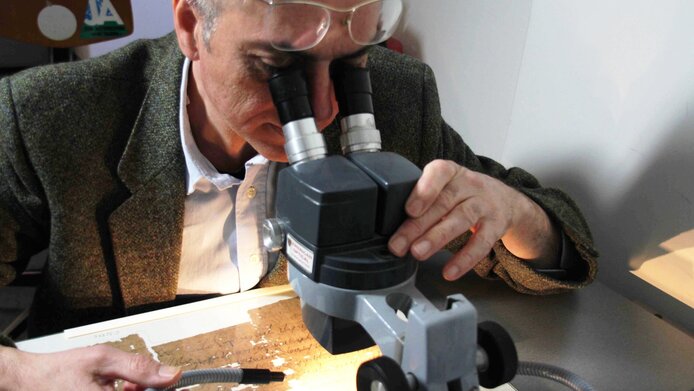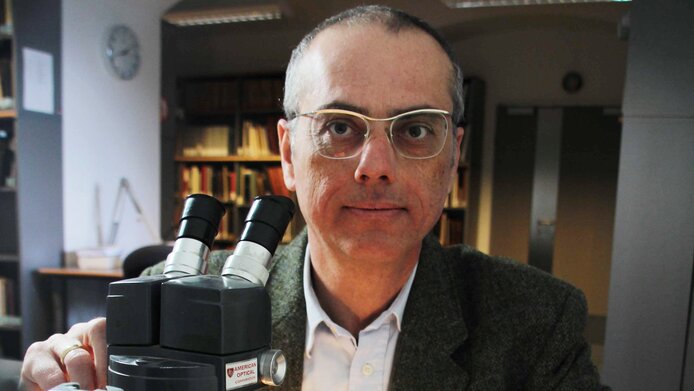A gigantic jigsaw puzzle

In the 1880s, a Viennese dealer in carpets and works of art discovered old papyri on the antiques market in Cairo, which came from ancient rubbish heaps, and he sent some of them to Vienna. Joseph von Karabacek, then Professor of Oriental History at the University of Vienna and Director of the Court Library (now the Austrian National Library), recognised the importance of these snippets of paper. Archduke Rainer, a patron of science, bought as much of the material as he could and presented the collection to Emperor Franz Josef for his birthday in 1899. So it was originally a matter of chance that Vienna became the centre of papyrus research.
Gigantic jigsaw puzzle
Today, 180,000 papyri from Egypt from the time between 1,500 BC and 1,200 AD are stored in the basement of the National Library behind several alarm-secured doors. They contain texts from daily life: administrative correspondence, invoices, leases and marriage contracts, as well as private letters; only a small proportion are literary texts. This is the largest papyrus collection in the world. Restoring them and exploring their contents is a time-consuming process — a gigantic jigsaw puzzle for researchers. In 1997, the papyrologist and director of the papyrus collection Bernhard Palme and his team were able to sift through more than 60,000 papyri and build up the collection at the Hofburg with funds from the FWF's START Award.
Sensational finds
Time and again, the researchers made sensational discoveries. The papyrologist Federico Morelli, then a member of Palme's team, found a complete dossier – letters between senior administrative officials from Egypt's early Arabic period. The texts tell us about the time when power on the Nile passed from the Byzantines to the Arabs. Until 30 BC, Egypt was a Greek dynasty. It was subsequently conquered by the Romans and remained part of the Byzantine Empire until the invasion of Arab troops in 639 AD. Until that time, the official language was Greek.
Pragmatic conquerors
From the first one and a half centuries of Arab rule, a large number of Greek texts have been preserved on papyrus. The texts examined by Morelli show that the Islamization of Egypt took place very slowly and was not achieved by brute force. For a long time, Christianity remained the religion of the vast majority of the population. The new rulers avoided clashes, took over the very well-organized administration and accorded their subjects a great deal of freedom. “That was a very pragmatic approach,” says Morelli. The most recent official document from Egypt, written in Greek and discovered by the native Italian, dates from 796 AD and was written long after the conquest of Egypt by Arab troops. “Until the end of the 7th century, most texts were written in Greek, which means there was no attempt on the part of the Arabs to impose their own language,” reports the researcher.
Arab conquerors: tolerant rulers?
The texts convey a great deal of information about the relations between indigenous Christians and Arabs. “Religion hardly ever comes up, though. Islamization took place late and at a slow pace. People more likely converted for fiscal than for religious reasons, because Christians and Jews had to pay higher taxes. Were the Arab conquerors tolerant rulers, then? “From my point of view, they were,” Morelli concurs. “The papyri do not present a negative image. Living together seems to have worked well.” What can this mean for views on today's Islam? “That's a delicate question,” the scholar says cautiously. “If you create a picture in which the Arabs are drawn too positively, some people may dislike it. I read and interpret the texts, but I don't make value judgements.”
Direct historical evidence
Morelli considers the original documents he studies in his current FWF-funded project, Between Two Worlds. Greek Papyri from Early Arab Egypt, to be extremely relevant in terms of history, for they are the only direct evidence from the time of the great Arab expansion and are therefore fundamental to our understanding of the transformation of the eastern and southern parts of the ancient/Christian world into Islamic/Arab regions. “They reflect the subjects' point of view, which often differs from existing historiographical sources and thus supplement and correct the frequently one-sided picture history books have given us.”
Painstakingly detailed work
Translating ancient snippets of paper, classifying them correctly and linking them with existing finds is very painstakingly detailed work — only a few dozen people worldwide are able to do this. This research requires enormous background knowledge from a range of different disciplines. Of the 60,000 Greek texts, only 5,000 have been edited so far. “The texts were bought indiscriminately,” says Morelli. The correspondence between senior officials, for example, is scattered throughout the entire collection. Every text has a number, but their content is not known. “The part on the left may have the number 1525, the middle part 30060 and the part on the right 52796,” the Italian researcher says to illustrate the challenge.
Interdisciplinarity creates a dilemma
He also considers the interdisciplinary context in which the scholars of antiquity explore these texts to be one of the reasons why the texts have been somewhat neglected for a long time. “A papyrologist comes either from classical philology, like me, or from ancient history. Texts from the 7th and 8th centuries do not belong in either discipline. But even Arabists do not study them because they are written in Greek.” Morelli describes the fact that he has specialised in this niche field as “suicidal in terms of career management”. “If you want to apply for a professorship, you are too specialized, you work between disciplines,” says the 55-year-old scholar.
Papyri show real life
After completing high-school in Florence, young Federico Morelli actually wanted to become a jazz guitarist, but ultimately chose a different path: because he was very good in Latin and Greek at school, he enrolled in classical philology at the University of Florence. However, he felt that the study of literary texts was too selective. “You get the impression that people started their day by going to the theatre, then read Homer and took walks talking about philosophy in the afternoon. The papyri tell us how people really lived. I was more interested in that,” he notes, outlining the path leading him to papyrology. After several stays in Egypt and at the University of Heidelberg for excavations and research, the young postdoc accepted Bernhard Palme’s call to Vienna in 1998 for the FWF-funded START project.
Science and family are difficult to reconcile
The respected scientist blames several problematic aspects of the academic system for the fact that there was no permanent position available to him after the six years. The older he gets, for instance, the more difficult he finds it, as a father of two, to accept the required mobility: “I neither wanted to leave my family nor commute by plane between Vienna and another city every week. That is something I also find hard to justify from an ecological point of view.”
Who does the research?
He sees another major problem in the fact that there are hardly any tenured positions beyond the professorship. According to him, anyone who reaches the top and becomes a professor has hardly any time left for research, which has to be entrusted to young scientists, because a professor has so many other tasks in teaching, in committees and other bodies. “But we also need experienced people who really see active research as their main task,” he says.
Problematic six-year rule
Morelli sees the six-year rule, which was originally intended to prevent young scientists from getting stuck in fixed-term contracts, as another major problem in the university system and offers a drastic comparison: “It's like being a supermarket cashier who, after six years, either becomes the branch manager or has to quit.”
Fixed-term contracts discourage criticism
Quite generally, the scholar considers fixed-term contracts to be an instrument to thwart criticism – not only in the world of research: “Workers' rights, which people have pursued over almost 200 years, are either revoked or people are put in a situation where they do not claim their rights because they feel too vulnerable.”
Education for an open society
The researcher is also concerned by how marginalized the humanities are becoming in the Austrian school system: “Greek philosophy, democracy, Roman law, Renaissance, Enlightenment and so on. These are the foundations of our civilization,” says Morelli. “How can you talk about values and at the same time make their foundations disappear from school education? We need education for an open society and for integration. Integration does not mean being able to sing the national anthem and eat Wiener Schnitzel.” Federico Morelli has a story to share in this context: his wife, an art conservator at the Kunsthistorisches Museum, wanted to persuade their daughter’s teacher to take the school class to the museum – in vain. “Instead, the class visited a well-known road construction company,” relates the distraught Morelli and muses: “Road construction? Are those our values?”
5 basic research projects in 13 years
The relevance and high quality of Federico Morelli's research activities is reflected by the fact that he is extremely successful in applying for third-party funding to the FWF, an institution he dubs the “saviour of the edition of the Viennese papyri”. Since 2005, he has been granted a total of five three-year research projects, each as a grant-salaried principal investigator. There is still enough work left to do in the papyrus collection, but the only question is who will finance it. “Processing the holdings would really be necessary from a scientific point of view. However, an edition risks not being funded in the form of a project, because it is not innovative enough. The professors also have many other tasks. As a result, the work doesn’t get done,” says the papyrologist, pointing out the dilemma. For the time being, thousands of texts are still waiting in the basement in boxes, neatly sorted into envelopes. At a constant temperature and in a dry environment, they await their discovery – as they once did in Egypt.
Personal details
Federico Morelli graduated in Classical Philology and Papyrology at the University of Florence. After several periods of excavation and research in Egypt and Heidelberg, the native Italian moved to Vienna in 1998, taking up a position at the Academy of Sciences, where he began work on the editing of Greek papyri from the papyrus collection of the Austrian National Library. He acquired his professorial qualification in German in 2006 and in Italian in 2014. From 2005, he held a postdoc position, converted to senior postdoc as of 2008, at the Institute of Ancient History at the University of Vienna. Morelli is a member of the Steering Committee of the International Society of Papyrologists, which consists of 12 international scholars. His research focuses on Greek documents from late antiquity and the early Arab period, economic history, palaeography and literary papyrology.







